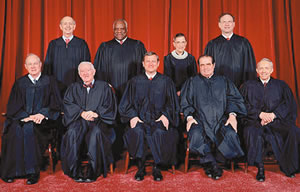The Supremes’ Constitutional Tilt

Wednesday - July 02, 2008
| Share
 Del.icio.us
Del.icio.us
|
The Fourth of July reminds me how lucky I am to be born in this country of free expression where nobody beats you and burns your house if you vote for the opposition.
But that freedom is only as good as it remains on the very worst days of our lives - for instance, in the aftermath of 9/11. How committed are we to the rights spelled out in our Constitution? How much is that still a “living” document for our times?
Supreme Court Justice Antonin Scalia complained recently about bad court decisions going back to the 1856 Dred Scott case that took up the issue of a slave’s rights - something never mentioned in the Constitution.
Scalia scorns those who don’t give enough weight to the words and intent of the writers of the Constitution and too much to modern evolution. Reminded that we used to have stocks and whippings as punishment and asked if he’d support that today, Scalia said yes, if that were written in the Constitution. So you know how he stands on gay marriage.
GOP presidential candidate John McCain says he’d appoint only jurists who agree to strictly interpret (McCain’s words) the Constitution. I’m not sure we’ve had one of those since Chief Justice Warren Burger, although justices Clarence Thomas and Joseph Alito come close. Scalia’s next, but he does give heavy weight to intent, not just words. He says “a text should not be construed strictly, and it should not be construed leniently; it should be construed reasonably, to contain all that it fairly means. While the good textualist is not a liter-alist, neither is he a nihilist. Words do have a limited range of meaning, and no interpretation that goes beyond that range is permissible.”
Justice Stephen Breyer is a “living” Constitution man who says the court must promote the political rights of minorities and look beyond the Constitution’s text, when necessary.
“We’re the boundary patrol,” Breyer says. “It’s a Constitution that protects a democratic system, basic liberties, a rule of law, a degree of equality, a division of powers, state, federal, so that no one gets too powerful.”
Did you know that Thomas Jefferson came to the presidency as a strict construction guy? Then he ignored that principle and sent U.S. forces against the Barbary pirates without consulting Congress. He purchased the Louisiana Territory from France with no provision in the Constitution for federal land buys.
Justice Breyer says it doesn’t make sense to follow the Constitution strictly. Judges must look at the real-world context, not focus solely on the framers’intent, because society is constantly changing.
“Those words, ‘the freedom of speech,’ and ‘Congress shall pass no law abridging the freedom of speech’ - neither they, the founders, nor those words tell you how to apply it to the Internet,” Breyer reminds us.
There’s nothing in the Constitution about limiting campaign contributions either, but the High Court OK’d that because, as Breyer explains, “You don’t want one person’s speech, that $20 million giver, to drown out everybody else’s. So if we want to give a chance to the people who have only $1 and not $20 million, maybe we have to do something to make that playing field a little more level in terms of money.”
Others, of course, find such “activism” horrifying.
Here’s what I hope to sell you this Independence Day:
Taking the Constitution literally, word for word, would give us something akin to Sharia, the Muslim canonical law that’s inflexible, allowing absolutely no deviance from the prophet Mohammed’s words of the 6th century.
That’s why it’s essential that we elect presidents who promise to appoint flexible justices to the Supreme Court.
Our Constitution is a guiding light, not the Everlasting Word.
If we’re to believe Dennis “Bumpy” Kanahele of the Nation of Hawaii, he’s going to convene Hawaiians in September, adopt a constitution, pull out of the United States and join the United Nations.
The fantasy persists with Kanahele that U.S. Marines rather than a local militia controlled mainly by non-Hawaiian businessmen overthrew the monarchy in 1893. And that there has been what Kanahele calls “over 100 years of political, economic and cultural suppression of our people.”
What we’ve had for more than 100 years is gullible Hawaiians being fed misinformation about the Islands’ takeover, end of the monarchy and the potential for independent nationhood by sovereignty charlatans such as Kanahele.
E-mail this story | Print this page | Comments (0) | Archive | RSS Comments (0) |
Most Recent Comment(s):













